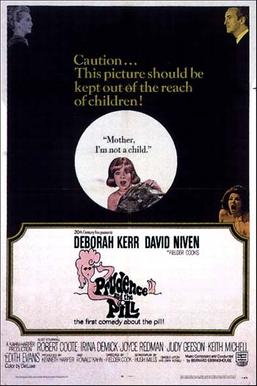Prudence and the Pill
Prudence and the Pill is a 1968 British comedy film directed by Fielder Cook and Ronald Neame. It stars Deborah Kerr and David Niven as a wealthy married couple who resort to using contraception to avoid having a child, leading to a series of misunderstandings and comedic situations. The film explores themes of marriage, fidelity, and the social implications of birth control during the late 1960s, a time when the subject was still considered taboo in many circles.
Plot[edit | edit source]
The story revolves around Prudence Hardcastle (played by Deborah Kerr) and her husband Gerald (played by David Niven), who live in a comfortable but emotionally distant marriage. In an attempt to avoid pregnancy, Prudence decides to secretly start taking the pill, a decision that reflects the growing awareness and availability of oral contraceptives during the era. Unbeknownst to her, Gerald has also decided to take measures into his own hands by substituting his wife's birth control pills with placebos, hoping that a child will bridge the emotional gap between them.
As the plot unfolds, the couple's servants, friends, and relatives become entangled in a web of deceit, mistaken identities, and romantic entanglements, all revolving around the use of, or avoidance of, birth control pills. The film humorously addresses the confusion and moral dilemmas faced by individuals when confronted with the then-new possibility of controlling reproduction.
Cast[edit | edit source]
- Deborah Kerr as Prudence Hardcastle
- David Niven as Gerald Hardcastle
- Iris Murdoch as Grace Hardcastle
- Robert Coote as Dr. Alan Hewitt
- Joyce Redman as Elizabeth Brett
- Judy Geeson as Geraldine Hardcastle
Themes[edit | edit source]
Prudence and the Pill touches on several significant themes, most notably the changing attitudes towards sexuality, marriage, and birth control. The film reflects the societal shift in the late 1960s towards a more open discussion of sexual health and contraception, a topic that had been largely taboo or restricted to private conversations. It also explores the dynamics of marriage and the impact of technology (in this case, the contraceptive pill) on personal relationships and societal norms.
Reception[edit | edit source]
Upon its release, Prudence and the Pill received mixed reviews. Critics praised the performances of Kerr and Niven but were divided on the film's treatment of its subject matter. Some viewed it as a bold and humorous take on a controversial topic, while others criticized it for making light of serious issues related to marriage and contraception. Despite the mixed critical reception, the film is notable for its role in bringing the topic of birth control into the mainstream cinema and contributing to the broader conversation about sexual freedom and reproductive rights.
Legacy[edit | edit source]
The film's exploration of birth control and its impact on relationships was ahead of its time, predating the widespread acceptance and use of the pill. Prudence and the Pill remains a cultural artifact of the 1960s, reflecting the era's changing attitudes towards sexuality and contraception. It is often cited in discussions of films that address social issues through comedy, and its contribution to the dialogue around birth control and women's rights continues to be recognized.
Search WikiMD
Ad.Tired of being Overweight? Try W8MD's physician weight loss program.
Semaglutide (Ozempic / Wegovy and Tirzepatide (Mounjaro / Zepbound) available.
Advertise on WikiMD
|
WikiMD's Wellness Encyclopedia |
| Let Food Be Thy Medicine Medicine Thy Food - Hippocrates |
Translate this page: - East Asian
中文,
日本,
한국어,
South Asian
हिन्दी,
தமிழ்,
తెలుగు,
Urdu,
ಕನ್ನಡ,
Southeast Asian
Indonesian,
Vietnamese,
Thai,
မြန်မာဘာသာ,
বাংলা
European
español,
Deutsch,
français,
Greek,
português do Brasil,
polski,
română,
русский,
Nederlands,
norsk,
svenska,
suomi,
Italian
Middle Eastern & African
عربى,
Turkish,
Persian,
Hebrew,
Afrikaans,
isiZulu,
Kiswahili,
Other
Bulgarian,
Hungarian,
Czech,
Swedish,
മലയാളം,
मराठी,
ਪੰਜਾਬੀ,
ગુજરાતી,
Portuguese,
Ukrainian
Medical Disclaimer: WikiMD is not a substitute for professional medical advice. The information on WikiMD is provided as an information resource only, may be incorrect, outdated or misleading, and is not to be used or relied on for any diagnostic or treatment purposes. Please consult your health care provider before making any healthcare decisions or for guidance about a specific medical condition. WikiMD expressly disclaims responsibility, and shall have no liability, for any damages, loss, injury, or liability whatsoever suffered as a result of your reliance on the information contained in this site. By visiting this site you agree to the foregoing terms and conditions, which may from time to time be changed or supplemented by WikiMD. If you do not agree to the foregoing terms and conditions, you should not enter or use this site. See full disclaimer.
Credits:Most images are courtesy of Wikimedia commons, and templates, categories Wikipedia, licensed under CC BY SA or similar.
Contributors: Prab R. Tumpati, MD

